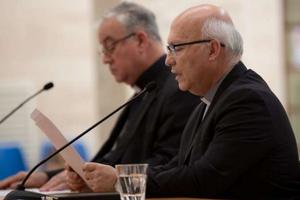Pope Francis: Are You Ready for Your Final Farewell?
The Holy Father’s May 19 homily focused on Jesus’ departure from his disciples and St. Paul’s farewell before going to Jerusalem.

VATICAN CITY — Pope Francis focused his Tuesday homily on many different “good-byes” that happen during life and asked whether attendees were ready for the final, most important farewell before going to the Father.
“Am I prepared to entrust to God all that I have? To entrust myself to God? To say that word which is the word of the Son entrusting himself to his Father?” the Pope asked May 19.
“I’m thinking of the great farewell, my great farewell, not when I must say, ‘See you then,’ ‘See you later,’ ‘Bye for now,’ but ‘Farewell.’”
Pope Francis spoke to those present in the Vatican’s St. Martha guesthouse for his daily Mass. He took his inspiration from the day’s readings, where Jesus says farewell to the disciples before his passion and death and when St. Paul bids farewell before going to Jerusalem and weeps on the beach with those who came to say good-bye to him.
He noted how both readings use the word addio, meaning “farewell” in the final sense. Paul, he noted, entrusts everything he has to the Lord, while Jesus entrusts his disciples to God.
“We only say addio at a time of final farewells, be they of this life or be they our final farewell,” he said, and he spoke of the various types of small good-byes we say in our lives.
There is the good-bye of a mother who hugs her son before he leaves for war, and every day she wakes up with the fear that someone will come to thank her for the generosity of her child in giving his life for his nation, Francis said.
He spoke of the good-byes of the “poor Rohingya from Myanmar,” who fled persecution in their homeland and are now stranded at sea.
These people, he noted, have “been in boats for months over there. They arrive in a town where people give them water and food and tell them to go away. That’s a farewell.”
The Rohingya people are an Indo-Aryan ethnic group largely from the Rakhine state of Burma, in west Myanmar. Since clashes began in 2012 between the state’s Buddhist community and the long-oppressed Rohingya Muslim minority, more than 100,000 Rohingyas have fled Myanmar by sea, according to the United Nations.
In order to escape forced segregation from the rest of the population inside rural ghettos, many of the Rohingya — who are not recognized by the government as a legitimate ethnic group or as citizens of Myanmar — have made the perilous journey at sea in hopes of evading persecution.
Currently a number of Rohingyas — estimated to be in the thousands — remain stranded at sea in boats, with dwindling supplies, while Southeastern nations such as Thailand, Indonesia and Malaysia refuse to take them in.
In his homily, Pope Francis said a “great, existential farewell is taking place in our times,” particularly for the Christian and Yazidi populations in Iraq, who have been “chased out of their homes” and believe that they can never come back.
“This is happening now,” he said.
He then turned his thoughts to the final farewell each person will make before leaving this world. Francis encouraged attendees to do an examination of conscience, asking themselves: “What will I leave behind?”
St. Paul himself makes an examination of conscience when he speaks of the things he has done during his life and the uncertainty that faces him in Jerusalem, the Pope observed.
He said that it is good for each person to imagine his or her final farewell, saying, “We don’t know when it will happen, but it will be that moment when expressions like ‘See you later,’ ‘See you soon,’ ‘See you tomorrow,’ ‘Good-bye for now’ will become ‘Farewell.’”
The Holy Father concluded his homily by praying that the Holy Spirit would teach each person how to say “Farewell” and how to truly entrust themselves to God at the end of their lives.

















